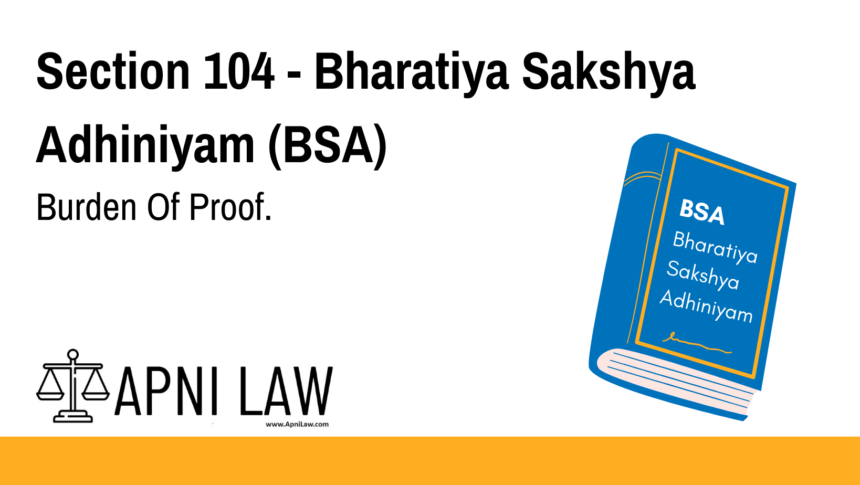Code: Section 104 Bharatiya Sakshya Adhiniyam, 2023
Whoever desires any Court to give judgment as to any legal right or liability
dependent on the existence of facts which he asserts must prove that those facts exist, and
when a person is bound to prove the existence of any fact, it is said that the burden of proof
lies on that person.
Illustrations.
(a) A desires a Court to give judgment that B shall be punished for a crime which A
says B has committed. A must prove that B has committed the crime.
(b) A desires a Court to give judgment that he is entitled to certain land in the
possession of B, by reason of facts which he asserts, and which B denies, to be true. A must
prove the existence of those facts.
Explanation of Section 104 BSA
Section 104 of the Bharatiya Sakshya Adhiniyam, 2023 lays down the foundational principle of the “burden of proof” in legal proceedings. The section states that:
- If a person wants the court to decide in their favor based on certain facts, then they must prove those facts.
- The person making a claim, allegation, or assertion has the burden of establishing the truth of that assertion.
- This principle applies to both civil and criminal cases.
In legal terms, this concept ensures that parties who seek relief or claim a right must support their case with sufficient evidence. The court does not assume any fact unless it is proven by the party asserting it.
Key Takeaways:
- The burden of proof lies on the person who makes a factual claim before the court.
- This burden does not shift unless the law or circumstances require it (as outlined in other provisions).
- It ensures fairness by requiring claims to be supported by evidence.
Illustration
To better understand the principle, consider the two official illustrations:
(a) A accuses B of committing a crime and wants the court to punish B.
→ A must prove that B committed the crime.
(b) A claims ownership over a piece of land that is currently in B’s possession.
→ A must prove the facts that entitle him to that land (such as a sale deed, inheritance, etc.).
In both scenarios, the party asking for a legal remedy must prove the facts upon which the request is based.
Common Questions and Answers on Section 104 BSA
- What does “burden of proof” mean?
- It means the obligation of a party to prove the facts they assert in court to obtain a favorable judgment.
- On whom does the burden of proof lie?
- It lies on the party who asserts a fact or claims a right or liability based on that fact.
- Does the burden of proof ever shift?
- Yes, in certain circumstances defined by law, the burden may shift to the other party (see Sections 105 to 113 of BSA for specific situations).
- Is this principle applicable to both civil and criminal cases?
- Yes. Whether it’s a civil dispute or a criminal prosecution, the party making the allegation must prove it.
- What happens if the burden of proof is not discharged?
- If a party fails to prove the facts they assert, the court may dismiss the claim or give judgment in favor of the opposing party.
Conclusion
Section 104 of the Bharatiya Sakshya Adhiniyam, 2023 establishes a cornerstone of the Indian legal system — the concept that one who asserts must prove. It safeguards the judicial process by ensuring that no individual is punished or granted relief unless the facts justifying such relief are first proven.
Understanding the burden of proof is crucial for litigants, lawyers, and judges alike, as it dictates how legal battles are framed and decided in court.
For detailed legal analysis and updates on Indian evidence law, visit ApniLaw.








